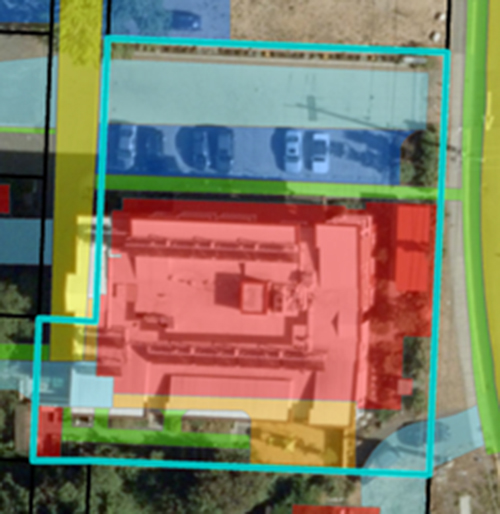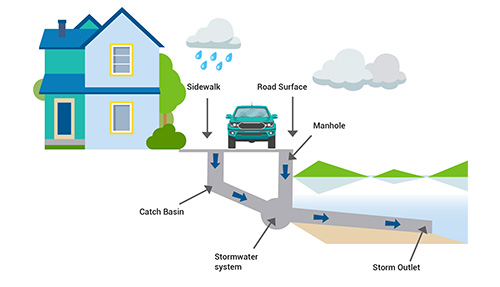Stormwater Fee

For more information about the stormwater fee and credits
Email [email protected]

Stormwater Management
The City of Hamilton will implement a stormwater fee in 2027. The rate is determined annually, each fall by Council. This fee will be a more fair and equitable way for property owners to pay for stormwater services in Hamilton than the current approach.
Starting in 2027, all developed properties in Hamilton will be charged based on the load (or use) they place on the stormwater system. Residential properties will pay based on the type of dwelling (e.g., single family detached dwellings, duplexes/townhomes and multiplexes). Industrial, Commercial, Institutional and large, multi-residential properties will pay based on their measured imperviousness (the amount of hard surface on their property).
When this new fee is implemented, wastewater charges will no longer be used to fund stormwater management activities, and the stormwater fee will be broken out as a separate line item on monthly utility bills. Wastewater/stormwater customers can expect a restatement (reduction) of their wastewater rate of approximately 20% on average, as the stormwater program will no longer be funded through the wastewater rate. Properties that currently do not pay for water or wastewater will start receiving a stormwater utility bill in 2027.
Stormwater Fee Calculation
A property's stormwater fee is calculated by multiplying the number of billing units assigned to the property by the current rate per billing unit.
Stormwater fees are based on the type of dwelling. Billing units are assigned to the different residential types featuring six or fewer dwelling units.
| Type | Billing Units per Dwelling Unit | Estimated 2026 Stormwater Fee |
|---|---|---|
| Single detached home (With or without additional dwelling unit) | 1 | $200.75 annually or $0.55/ day |
| Semi-detached homes, townhomes, duplexes | 0.5 | $100.38 annually or $0.28/ day per dwelling unit |
| Triplex to six-plex | 0.3 | $60.23 annually or $0.17/ day per dwelling unit |
Example calculation
These examples use the stormwater rate of $200.75, which was the original rate for 2026.
Stormwater fees will be based on the measured amount of impervious area (hard surfaces) on the property, determined using aerial photography.
Residential properties with seven or more units
Residential buildings with seven or more units would be charged 1 billing unit for every 291 m2 of impervious area (e.g., roads, parking areas, walkways, roofs). 291 m2 is the average impervious area of a single-family home in Hamilton. Outdoor pools are not considered as impervious area.
Non-Residential Properties
Industrial, commercial, institutional and agricultural
Non-residential buildings would be charged 1 billing unit for every 291 m2 of impervious area (e.g., roads, parking areas, walkways, roofs).
Credits & Rebates
The City of Hamilton is offering a Stormwater Incentive Program to properties that manage stormwater. Residents can qualify for the Rain Ready Rebate Program (helping cover the cost of eco-friendly upgrades). Industrial, commercial, institutional, multi-residential and agricultural properties can qualify for credits (reducing your monthly fee). The incentive program was developed using community feedback and common best practices in other municipalities. Community feedback details can be found at Stormwater Incentive Program
Download the Stormwater Fee Guidance Manual to learn more about the credit program and appeals / reassessment processes.
Note: A property is only eligible for one type of Credit. The Rain Ready rebate is not a credit stream so some properties may receive a Green Space Credit and apply for a rebate for the residential property on-site.
The Need for a Stormwater Fee
The City of Hamilton conducted a Stormwater Funding Review in 2023 to assess a fairer way to pay for stormwater management. The key findings showed:
- Hard surfaces increase runoff, putting more strain on stormwater infrastructure.
- Some properties contribute more runoff but pay less, while others contribute less but pay more under the current system.
- A stormwater fee – where properties pay based on their stormwater impacts – provides a more fair, equitable and sustainable way to fund critical infrastructure and services.
As part of the review, staff also consulted with the public on a financial incentive program. The consultation period included public information sessions and a survey.
Switching to a stormwater fee will provide a more equitable and sustainable way to fund stormwater management in the City of Hamilton. This new approach ensures that costs are distributed based on the amount of runoff a property generates, rather than on how much City water is used. This change will:
- Be fairer for everyone – Properties will contribute based on their impact, meaning those with more hard surfaces (like parking lots and large rooftops) will pay more than those with less.
- Be a dedicated funding source for critical infrastructure, projects and action plans – A stable funding source will help the City reduce flooding, remove stormwater from the combined sewer system, improve the quality of natural water bodies that receive stormwater runoff, and adapt to a changing climate.
- Encourage sustainable practices – Incentives and credits will reward property owners who take steps to reduce stormwater runoff, such as detention ponds, permeable pavement
,or rain gardens.
Frequently Asked Questions
We know that some people with large properties are worried about how the new stormwater fee will affect them. That’s why the City will be offering a Green Space credit. This credit will help to reduce the stormwater fee for properties that have a large amount of green space, like forests and fields. This credit will be applied automatically to the stormwater fee without the need for a credit application.
The City invests millions of dollars per year in stormwater services for rural parts of Hamilton, which provides valuable benefits to the rural community:
- City staff inspect, fix and clean assets like culverts, stormwater ponds and ditches. They also reshape ditches to better catch dirt and mud and address invasive species.
- The City takes care of natural watercourses, like streams and wetlands, inspecting, cleaning them of debris and sediment, and fixing places where the water is eroding the land.
- The City addresses water quality issues from pollutants that include high levels of nutrients like phosphorus.
- The City also contributes millions of dollars each year to Conservation Authorities which address watershed management issues in rural and urban areas.
Right now, much of this work is paid for through City water and wastewater rates. But some rural and agricultural property owners do not pay into this funding system. The City’s stormwater fee ensures that all property owners contribute. This way, everyone helps pay for managing stormwater, whether you live in the urban centre, a suburban neighbourhood or one of Hamilton’s rural communities.
A rural property with just a house (e.g., no commercial, industrial or agricultural buildings) will be charged as a residential property and will pay the same as any other house in the city. An agricultural property with just outbuildings like barns and greenhouses will be treated as non-residential and will be charged based on how much of the land is covered by hard surfaces (like roads, parking areas, walkways and roofs) and how much is green space. A property that is undeveloped (like fields or gardens), with no hard surfaces will not be charged any fee.
Since many agricultural properties have both a house and outbuildings, the stormwater fee for those properties will be calculated based on the impervious area of the property, however many of these properties will be eligible for the Green Space Credit.
Like other properties in Hamilton, residential-only rural properties would be eligible for the Rain Ready Rebate program offered through Green Venture, and agricultural properties would be eligible for the approved Green Space Credit.
The City’s stormwater program includes important work in the rural areas to keep the system working well:
- City staff inspect, fix and clean assets like culverts, stormwater ponds and ditches. They also reshape ditches to better catch dirt and mud and address invasive species.
- The City takes care of natural watercourses, like streams and wetlands, inspecting, cleaning them of debris and sediment, and fixing places where the water is eroding the land.
- The City addresses water quality issues from pollutants that include high levels of nutrients like phosphorus.
- The City also contributes millions of dollars each year to Conservation Authorities which address watershed management issues in rural and urban areas.
With the current incentive program, credits are only available for industrial, commercial, institutional, agricultural, and multi-residential properties.
Residential properties with 6 or fewer units are eligible for rebates. This is based on community engagement feedback and similar residential incentive programs offered in Ottawa, Guelph, Kitchener, and Waterloo. Visit Stormwater Incentive Program Engagement Project to review more information on the community feedback received.
The City’s new stormwater fee is designed with fairness and simplicity in mind. There are over 120,000 single-family homes in Hamilton – this makes up 84% of all properties. Charging each residential property owner a different fee based on the actual measured amount of hard surfaces on their property (like driveways and rooftops) would require significant time and effort to calculate and monitor. Additional staffing resources would be needed to administer this approach. After careful analysis, we found that the City can provide a lower stormwater fee for everyone by avoiding the administrative expenses that would be required to calculate and continually monitor individual property rates. Therefore, to keep things both fair and simple, all single-family residential properties will share the same rate.
Multi-family residential properties typically have a smaller footprint than single-family detached homes, so they will be charged less. The rate for townhouses and duplexes will be half of the rate of a single-family detached home, while the rate for triplexes, fourplexes, five-plexes and six-plexes will be approximately one-third of a single-family detached home. These categories will be determined using Municipal Property Assessment Corporation (MPAC) property assessments.
Every property contributes to stormwater runoff that eventually ends up in a storm drain, City culvert, ditch, creek, or other natural waterbody. All these systems need to be monitored, maintained, repaired, replaced and/or upgraded to address extreme weather events or improve water quality. This stormwater fee will help with the cost of managing stormwater on roads, near properties, and in waterbodies. Stormwater management activities benefit everyone, so all properties need to contribute.


